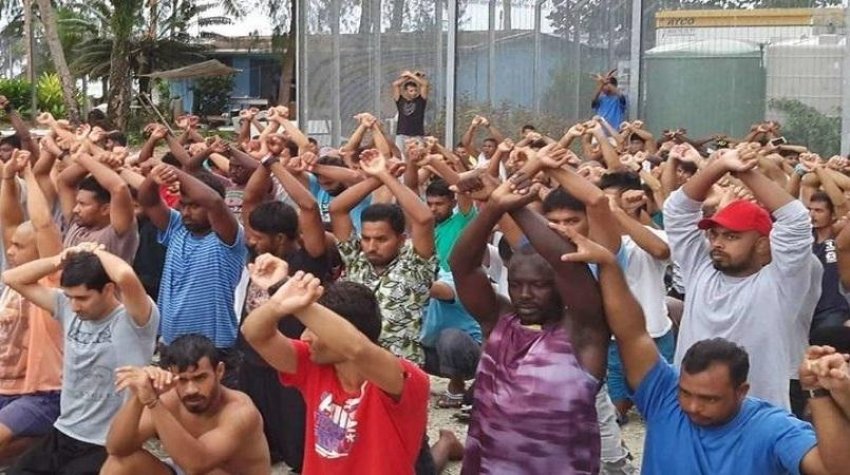
1) This is a political stand
Refugees are staying inside Manus Island detention centre to make a political statement, one that is getting broadcast around the world and inspiring numerous actions in Australia.
They are demanding freedom. Iranian refugee Behrouz Boochani, who is on Manus Island, said on November 7: “The reason refugees don’t want to leave is not because of encouragement. It’s because freedom and safety are our right.”
The only way this can be achieved is by evacuating the men on Manus, not sending them to another detention centre on the island that is unsafe.
2) Australia is denying the men water, food and electricity.
When the Australian government officially closed Manus Island detention centre on October 30, it withdrew all personnel, stopped providing food and cut off the power and water.
The men in Manus have being working to find solutions to this crisis. They have dug a well to find water.
The men have also created a system out of gutters to catch and store the rainwater.
One of the men is an engineer and managed to repair a broken generator that was left behind by the Australian government. Authorities then went into the camp and removed the generator.
Locals have attempted to bring food into the camp, but have been stopped by navy and police personnel. A few locals attempted to deliver food under the cover of darkness on small boats, but were intercepted and arrested.
One of the men on Manus wrote in response: “Heavily armed PNG army ready to assault own citizens in little boats armed only with food & water for starving men. War on own people ordered by Australia.”
A court action was lodged to demand authorities allow the passage of food into the camp; however the PNG Supreme court ruled on November 7 that authorities could continue to block food and water being delivered.
The men have gone without food since October 30.
3) A medical crisis is looming
Australia has withdrawn medical support to the men in the detention centre and the support available to people living in the three alternative areas is inadequate.
For 24 hour medical care, the men must go to the Manus Island hospital, which is already struggling to cope with the needs of the local population. If they did go to the local hospital, it would inevitably lead to more conflict between refugees and locals.
A refugee who suffered a heart attack had to wait more than four hours to be taken to hospital. Upon arrival, the ECG machine was found to not even be working.
The men also do not have the resources to pay for medicine. Many in Manus Island detention centre have been on medication for years but cannot access it anymore and are suffering from withdrawal.
The tropical conditions themselves pose major medical threats. Now that fumigation has stopped, mosquitoes are rife and malaria is major threat.
4) The men have been attacked, killed by locals
The men fear attacks by locals if they move to any of the alternative accommodation sites. Already, a number of them have been viciously attacked by locals wielding machetes.
Earlier this year, in what is now known as the Good Friday shootings, PNG naval personnel fired live ammunition into the centre.
Reza Berati’s death in 2014 was caused by locals and guards storming the centre and beating him to death with a rock.
Since Australia began closing the centre a couple of months ago, two men who moved to East Lorengau have been found dead.
One man, Hamed Shamshiripour, was found hanging from a tree in bushland near a hospital. His body was battered and bruised. His death was ruled a suicide, but refugees on Manus have called for an independent investigation into his suspicious death.
5) Alternative accommodation is not even ready
Large sections of the three accommodation sites that Australia is demanding the men move to are not even ready.
One of the sites, West Haus, is reported to not have water and electricity.
The West Lorengau site is still a construction zone and has four toilets to serve everyone living there.
Neither site has a proper security fence, leaving many fearing for their safety.
6) The New Zealand offer and US deal are not enough
In a protest inside Manus Island detention centre on November 8 a spokesperson said: “We want freedom in a safe country. We want the international community to intervene. We are not going to leave this detention centre to go to another detention centre.”
The men in Manus have said they want to be resettled in a UNHCR-approved country like the United States, Canada or New Zealand.
Australia has rejected New Zealand’s offer to take 150 people, saying it wants to see out the US deal first.
Only a few dozen people have gone to the US under the refugee swap. Even if the deal is completed, this would still leave a number of the refugees currently on Manus Island and Nauru behind.
7) This is not about stopping the boats
And it never has been.
Earlier this year, documents obtained under the Freedom of Information Act showed that the Australian immigration minister had ordered the navy to turn back boats on numerous occasions over the past few years.
The boats have only stopped in so far as they have been turned back at sea to danger – the Manus Island detention centre has not acted as a deterrent.
[Compiled by Zebedee Parkes, a Socialist Alliance member and activist with the Refugee Action Coalition, Sydney.]
Like the article? Subscribe to Green Left now! You can also like us on Facebook and follow us on Twitter.